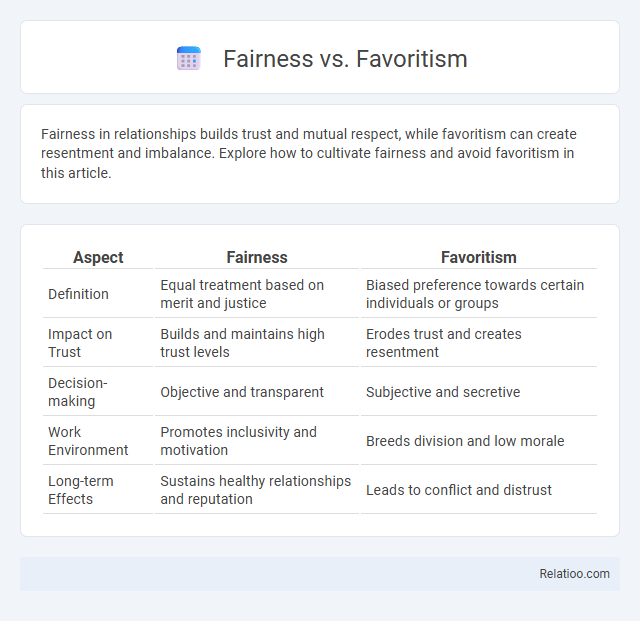Fairness in relationships builds trust and mutual respect, while favoritism can create resentment and imbalance. Explore how to cultivate fairness and avoid favoritism in this article.
Table of Comparison
| Aspect | Fairness | Favoritism |
|---|---|---|
| Definition | Equal treatment based on merit and justice | Biased preference towards certain individuals or groups |
| Impact on Trust | Builds and maintains high trust levels | Erodes trust and creates resentment |
| Decision-making | Objective and transparent | Subjective and secretive |
| Work Environment | Promotes inclusivity and motivation | Breeds division and low morale |
| Long-term Effects | Sustains healthy relationships and reputation | Leads to conflict and distrust |
Understanding the Concept of Fairness
Fairness involves impartial treatment and equal opportunity, ensuring decisions are based on objective criteria without bias or favoritism. It promotes trust and respect by valuing consistency and transparency in actions and judgments. Integrity underpins fairness by committing to honesty and ethical principles, preventing preferential treatment that undermines equity.
Defining Favoritism in Various Contexts
Favoritism involves giving preferential treatment to certain individuals based on personal biases rather than objective criteria, often undermining fairness in professional and social contexts. Your ability to recognize favoritism helps maintain integrity by promoting equitable decision-making and fostering trust. In workplaces, schools, or communities, favoritism can skew merit-based opportunities, compromising ethical standards and overall cohesion.
The Psychological Impact of Fairness
Fairness fosters trust and psychological safety by ensuring equitable treatment and reducing feelings of bias and resentment. Favoritism undermines morale and increases stress by creating perceptions of inequality and injustice. Your sense of integrity strengthens when fairness is upheld, promoting mental well-being and a positive organizational culture.
How Favoritism Affects Morale and Productivity
Favoritism undermines workplace morale by creating a perception of unfair treatment, which erodes trust among employees and diminishes overall motivation. Your team's productivity can decline as favoritism fosters resentment and reduces collaboration, leading to disengagement and higher turnover rates. Upholding integrity is essential to maintain a fair environment that supports equal opportunities and enhances collective performance.
Fairness in the Workplace: Best Practices
Fairness in the workplace requires consistent application of policies and equitable treatment of all employees to foster trust and productivity. Implement transparent decision-making processes and establish clear criteria for promotions, rewards, and disciplinary actions to prevent favoritism. Enhancing your workplace culture with fairness-driven best practices ensures integrity and sustains employee morale and engagement.
Signs and Consequences of Favoritism
Favoritism often manifests through unequal treatment, biased decision-making, and exclusive opportunities favoring certain individuals, which can erode team trust and morale. Signs include inconsistent evaluations, preferential assignments, and lack of transparency in rewards or promotions. Your awareness of these patterns helps maintain integrity by promoting fairness, preventing decreased productivity, resentment, and potential conflicts within the organization.
Legal and Ethical Perspectives on Fairness
Fairness in legal and ethical contexts demands impartial application of laws and adherence to established standards, ensuring equal treatment without bias or favoritism. Favoritism, characterized by preferential treatment based on personal relationships or interests, undermines the rule of law and compromises ethical principles. Your commitment to integrity reinforces fairness by promoting transparency, accountability, and equitable decision-making in both legal and ethical frameworks.
Strategies to Prevent Favoritism
Implementing transparent decision-making processes ensures equal treatment and reduces perceptions of favoritism within organizations. Establishing clear criteria for evaluations and rewards promotes fairness and reinforces ethical standards. Regular training on bias awareness and ethical behavior cultivates a culture of integrity and accountability.
Building a Culture of Equity and Inclusion
Building a culture of equity and inclusion requires prioritizing fairness over favoritism by ensuring that all individuals receive unbiased treatment and equal opportunities. Integrity plays a crucial role in reinforcing transparent decision-making processes and holding leaders accountable for upholding ethical standards. You contribute to this culture by advocating for consistent policies that eliminate favoritism and promote respect for diverse perspectives.
Balancing Fairness and Personal Relationships
Balancing fairness and personal relationships requires maintaining integrity by applying consistent standards while recognizing individual circumstances. Favoritism undermines trust and fairness, leading to biased decision-making and diminished morale in professional or social environments. Ensuring fairness involves transparent actions and equitable treatment, fostering an environment where personal relationships do not compromise ethical standards.

Infographic: Fairness vs Favoritism
 relatioo.com
relatioo.com